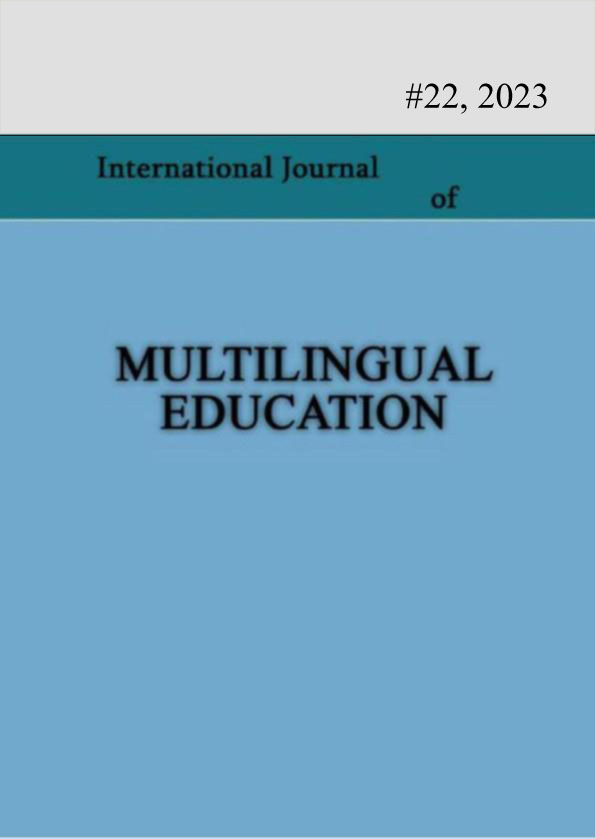History of Terminological Work in Georgia and Modern Georgian Terminology
Keywords:
Modern Georgian terminology, terminological tradition, transliterated terms.Abstract
This paper explores modern Georgian terminology against the backdrop of the history of Georgian term formation. It studies different periods of terminological work in the country and discusses the characteristic features, challenges and achievements of each period.
The empirical data that this article is based on was collected from several biological dictionaries (see the dictionary section of references), 800 terms altogether, from the fields of immunology, genetics and biotechnology.
The study applied a quantitative method of analysis. The selected terms were also analyzed with regard to their sources and structural-semantic characteristics. The tradition of Georgian term formation differs significantly from the state of modern Georgian terminology which is mostly filled with borrowings from the English language. This determines the necessity to re-evaluate the existing practice of terminological word formation and develop new approaches.
References
Cabre, M. T. (1992). Terminology - Theory, Methods and Application. Volume 1. John Benjamins publishing company, Amsterdam.
Fontenelle, Th. (2014). From Lexicography to Terminology: a Cline, not a Dichotomy, Proceedings of the XVI EURALEX International Congress: The User in Focus. Andrea Abel, Chiara Vettori & Natascia Ralli (eds.) Bolzano/Bozen: Institute for Specialised Communication and Multilingualism. pp.25-45.
Ghambashidze, R. (1986). Georgian Scientific Terminology and the Main Principles of its Compiling. Tbilisi: Metsniereba.
Ghlonti, A. (1983). The Issues of Georgian Lexicography. Tbilisi: Sabtchota Sakartvelo. https://euralex.org/wp-content/themes/euralex/proceedings/Euralex%202018/118-4-2995-1-10- 20180820.pdf https://www.academia.edu/39215607/The_Problems_of_Georgian_Terminology_History
_and_Modernity_?fbclid=IwAR1pQllRXj83ysJFO6fTEXxF3m- 14jg3RhF2apBmPeuzLandoTqKfpcLkc0.
ISO 704. (2022). Terminology work- Principles and Methods.
Karosanidze, L. & Khurtsilava, A. (2018). The Problems of Georgian Terminology. Tbilisi.
Karosanidze, L. (2012). The Problems of Georgian Terminology (History and Modernity). Kartvelology. 6. Tbilisi.
Margalitadze, T. (2018). New Platform for Georgian Online Terminological Dictionaries and Multilingual Dictionary Management System. Proceedings of EURALEX international congress. Ljubljiana, Slovenia.
Martin, W. (2006). In Quest of a Profile: Portrait of a terminologist as a Young Sublanguage Expert. Tübingen. pp. 73-94.
Melikishvili, D. (1975). The Language and Style of Philosophical Works of Ioane Petritsi.
Tbilisi: Ganatleba
Pochkhua, B. (1974). Lexicology of the Georgian Langugae. Tbilisi: Tbilisi University Press.
Suni, Dz. (2012). The Basics of Bioinformatics. Tbilisi: Ilia State University Press.
Dictionaries:
Cruse, J.M., Lewis, R.E. (2002). Illustrated Dictionary of Immunology (2nd edition). Publisher: CRC Press.
Kumar, Sh. (2007). Modern Dictionary of Genetics. Publisher: Deep & Deep Publications.
Lawrence, E. (2008). Henderson’s Dictionary of Biology (14th edition). Publisher: Benjamin Cummings.
Martin, E. & Hine, R. S. (2008). A Dictionary of Biology (6th edition). Publisher: OUP Oxford.
Oxford English Dictionary, second edition on CD-ROM. Version 3.1.
Singleton, P. & Sainsbury, D. (2006). Dictionary of Microbiology and Molecular Biology
(Third Edition, Revised). Publisher: Wiley.
Online Sources:
Encyclopedia Britannica, http://www.britannica.com
English-Georgian Online Biology Dictionary. http://bio.dict.ge/ka/ http://lingvo.abbyyonline.com https://manuscript.iliauni.edu.ge/converter/converter.html
Online Biology Dictionaries, http://www.macroevolution.net, http://www.alphadictionary.com, http://www.angelfire.com
Downloads
Published
How to Cite
Issue
Section
License
Copyright (c) 2023 Tamar Kvitsiani

This work is licensed under a Creative Commons Attribution-NonCommercial 4.0 International License.
Copyright (c) - Authors who publish with this journal agree to the following terms: Authors retain copyright and grant the journal the right of first publication with the work simultaneously licensed under a Creative Commons Attribution-Noncommercial 4.0 International License, which allows others to share the work with an acknowledgement of the work's authorship and initial publication in this journal. Authors are permitted and encouraged to post their work online (e.g., in institutional repositories or on their personal website) prior to and during the submission process, as it can lead to productive exchanges, as well as earlier and greater citation of published work (see The Effect of Open Access). Authors may enter into separate, additional contractual arrangements for the non-exclusive distribution of the journal's published version of the work (e.g., post it to a repository or publish it in a book), with an acknowledgement of its initial publication in this journal.

